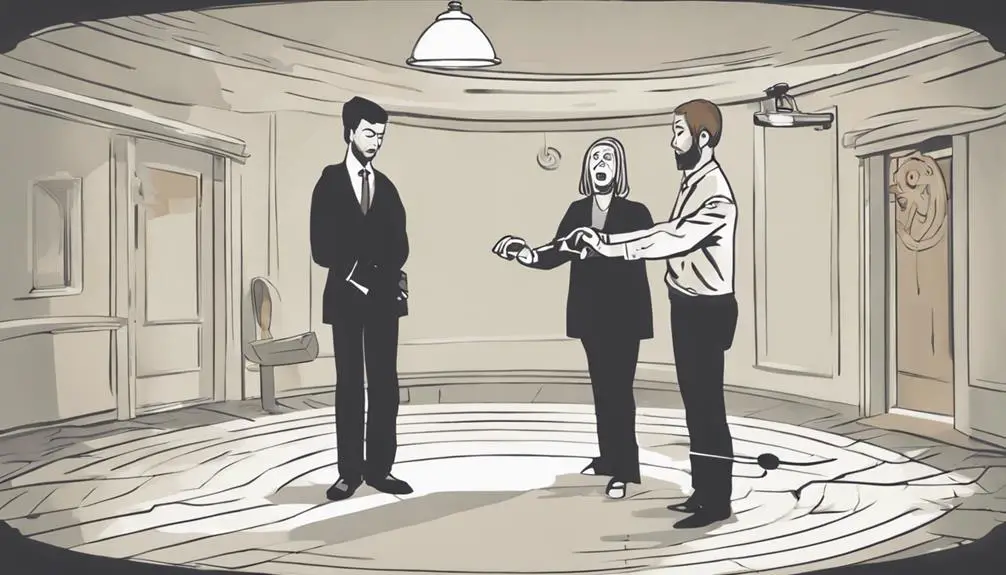Hypnosis
What Are the Truth About Hypnosis Misconceptions?
Misconceptions about hypnosis often arise due to a lack of understanding its therapeutic benefits and psychological effects. Hypnosis does not involve mind control but influences behavior and perception. Memory alteration myths debunk the idea of enhancing accurate recall under hypnosis. Stage hypnosis is entertainment, not mind control, with willing participants. Hypnosis induces a heightened state of suggestibility and focused attention, distinct from sleep. Be cautious of scams exploiting vulnerability with deceptive tactics. Exploring the reality of hypnosis can help clarify its true nature and dispel common misconceptions.
The Reality of Mind Control

Mind control, often associated with hypnosis, is a concept that requires careful scrutiny to separate fact from fiction. When exploring the ethical boundaries of mind control, it is crucial to rely on scientific evidence to distinguish reality from myths perpetuated by popular culture.
Scientific studies have shown that while hypnosis can influence behavior and perception, it does not grant control over one's mind against their will. Understanding the psychological effects of hypnosis is essential in recognizing its limitations and potential therapeutic benefits.
Research has indicated that hypnosis can have positive psychological effects, such as reducing anxiety, managing pain, and improving focus. However, it is essential to approach hypnosis with a critical mindset, acknowledging that individual responses may vary.
When used ethically and within appropriate boundaries, hypnosis can be a valuable tool in therapy, aiding individuals in overcoming challenges and enhancing their well-being. By considering the scientific evidence and understanding the psychological impacts of hypnosis, one can appreciate its therapeutic benefits while dispelling misconceptions about mind control.
Debunking Memory Alteration
Exploring the realm of hypnosis beyond its association with mind control, it is imperative to address and debunk misconceptions surrounding the alteration of memory. Memory recall during hypnosis is often misunderstood, with some believing that memories can be implanted or altered through suggestion.
However, research indicates that hypnosis does not enhance accurate memory recall but may increase the individual's confidence in their false memories.
Suggestibility testing is a crucial aspect when considering memory alteration under hypnosis. Studies have shown that individuals vary in their susceptibility to suggestion, impacting the extent to which memories can be altered during hypnotic sessions.
It is essential to note that memories retrieved under hypnosis are not always accurate and can be influenced by the hypnotist's cues or the individual's own beliefs.
Therefore, debunking the myth of memory alteration through hypnosis involves understanding the limitations of memory recall and the implications of suggestibility testing in shaping recollections under hypnotic states.
Unveiling Stage Hypnosis Myths

What misconceptions surround the practice of stage hypnosis that need to be debunked through analysis and evidence-based reasoning?
Stage hypnosis often falls victim to myths that portray it as a manipulation tool for entertainment purposes rather than a psychological phenomenon. By debunking entertainment-focused misconceptions and exploring psychology, a clearer understanding of stage hypnosis emerges.
Stage hypnosis is commonly misunderstood as a mind-control technique used solely for comedic or sensational purposes. In reality, stage hypnosis is a form of entertainment that leverages the power of suggestion and the subconscious mind, rather than controlling individuals against their will. It is essential to differentiate between the stage performance aspect and the therapeutic application of hypnosis.
Exploring psychology within stage hypnosis reveals that participants are willing volunteers who engage in the experience for entertainment, not because they are compelled to do so. Understanding the psychological dynamics at play during stage hypnosis performances helps dispel misconceptions about coercion and control, highlighting the collaborative nature of the practice.
Addressing Hypnosis as Sleep
Hypnosis is often mistakenly equated with sleep due to similarities in outward appearance and physiological responses, yet a closer examination reveals distinct differences between the two states. While both hypnosis and sleep involve a state of relaxation and altered consciousness, they serve different purposes. Hypnosis is not a form of sleep but rather a relaxation technique that induces an altered state of awareness where individuals are highly suggestible.
In hypnosis, individuals remain conscious and responsive to suggestions provided by a trained hypnotist. This suggestibility test is a key component of hypnotherapy, where hypnosis is used as a therapeutic tool to help individuals overcome various issues such as anxiety, phobias, and smoking cessation. Unlike sleep, hypnosis involves focused attention, heightened suggestibility, and an active participation from the person being hypnotized.
Understanding the distinction between hypnosis and sleep is crucial in debunking the misconception that hypnosis is simply a form of slumber. The therapeutic benefits of hypnosis stem from its ability to tap into the subconscious mind and facilitate positive changes, highlighting its value as a powerful tool in psychological interventions.
Exposing Hypnosis as a Scam

Recent investigations and analyses have shed light on the deceptive practices associated with the portrayal of hypnosis as a scam. Hypnosis fraud often involves individuals using manipulation tactics to exploit vulnerable people seeking help. These fraudulent practitioners may claim to have supernatural powers or the ability to control individuals' minds, preying on those desperate for solutions to their problems.
One common manipulation tactic used in hypnosis scams is the exploitation of suggestibility. Fraudulent hypnotists may use leading questions or subtle cues to influence individuals into believing they are under a hypnotic trance when, in reality, they are not. This deception can lead people to make decisions or reveal personal information they wouldn't otherwise disclose.
Moreover, hypnosis fraud can also involve financial exploitation, where practitioners charge exorbitant fees for services or promise unrealistic results to entice individuals into multiple sessions.
It is essential for the public to be aware of these manipulation tactics to avoid falling victim to hypnosis scams and seek reputable, ethical practitioners for any hypnotherapy needs.
Clarifying Hypnosis and Truth Serum
An examination of the relationship between hypnosis and truth serum reveals distinct differences in their mechanisms and effects on individuals' cognitive processes.
While hypnosis is a state of focused attention and heightened suggestibility, truth serum, often associated with drugs like sodium thiopental, aims to lower inhibitions and increase the likelihood of truthful responses.
One of the common hypnosis misconceptions is that it is a form of mind control or a truth serum itself. However, hypnosis cannot force individuals to reveal truths against their will, as it relies on cooperation and willingness to engage in the process.
On the other hand, truth serum effectiveness has been questioned due to ethical concerns and the potential for false memories or unreliable information under its influence.
Correcting Hypnosis as Mind Reading

Misconceptions surrounding hypnosis often lead individuals to associate it with mind reading, perpetuating a belief in its ability to extract information from individuals' thoughts without their consent or awareness. It is crucial to debunk this misunderstanding by clarifying that hypnosis is not a form of mind reading.
Hypnosis is a state of focused attention and heightened suggestibility, where individuals are more open to suggestions that align with their beliefs and values. While under hypnosis, individuals are not compelled to reveal confidential information or disclose secrets against their will.
The notion of hypnosis as mind reading stems from popular media portrayals that sensationalize the practice. In reality, hypnosis does not grant practitioners the power to manipulate minds or extract information covertly. The ethical practice of hypnosis involves gaining consent, building rapport, and using suggestions to help individuals achieve their desired goals, such as overcoming fears or breaking habits.
Frequently Asked Questions
Can Anyone Be Hypnotized?
Individual susceptibility to hypnosis varies based on psychological factors and cultural beliefs. Ethical considerations are crucial when determining who can be hypnotized. Understanding these nuances is essential in assessing the potential for hypnotic induction in individuals.
Is Hypnosis Dangerous?
Hypnosis, when conducted by trained professionals, is generally considered safe. However, potential risks such as false memories or heightened suggestibility exist. Safety measures include proper screening of clients, obtaining informed consent, and monitoring during sessions.
Can Hypnosis Make Me Do Things Against My Will?
Hypnosis, when conducted ethically, respects the individual's autonomy. It cannot make someone act against their will. Rather, it leverages consent and subconscious influence within ethical boundaries. Mind control is a misconception rooted in pop culture.
How Long Does the Effects of Hypnosis Last?
The effects of hypnosis can vary in duration. Research suggests that for some individuals, the benefits may be long-lasting, while for others, they may be more short-term. Statistics, common misconceptions, and case studies offer insights into the long-term impact.
Is Hypnosis Effective for Everyone?
The effectiveness of hypnosis varies among individuals due to individual differences and factors that influence receptiveness to hypnotic suggestions. Success rates can be influenced by factors such as suggestibility, motivation, and the skill of the hypnotist.
Conclusion
In conclusion, the misconceptions surrounding hypnosis often stem from misinformation and sensationalized portrayals in media. By examining the reality of mind control, memory alteration, stage hypnosis, sleep, scams, truth serum, and mind reading, it becomes clear that hypnosis is a legitimate therapeutic tool that operates on suggestion and heightened focus.
Understanding the truth about hypnosis can help dispel myths and misconceptions, allowing for a more accurate and informed view of this practice.
